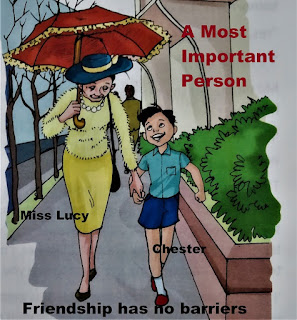Reading 1
1. Based on your reading of the text, select the best option
for each of the following.
a. ‘She stopped feeding, and rumbled gently.’ Tuskless
‘rumbled’
i. to signal other elephants to come.
ii. to scare humans away.
iii. to shake the bananas loose.
iv. to show reluctance to move out.
b. ‘Each elephant grabbed a last trunk full and started
backing or turning away, reluctantly abandoning the banquet.’ The elephants
left ‘reluctantly’ because
i. they were scared of the sound of the engine
ii. they wanted to look for more food jin the collapsed
kitchen.
iii. there was no food in the forest.
iv. they had had their fill and it was difficult to move.
Answers:
1. a. i. to signal other elephants to come
1. b. ii.they wanted to look for more food in the collapsed kitchen.
2. Answer the following questions.
a. Who was Tuskless? How was she drawn to the camp?
Tuskless was a female elephant. She was drawn to the camp
because of the smell of food items. She got the smell of bananas and she was
very fond of bananas.
b. How did Tuskless developed a taste for bananas?
Once Tuskless was given overripe, almost fermented bananas
at the camp’s feeding place. She ate them with great relish. From then onwards
Tuskless developed a taste for bananas.
c. How did the elephants enter the kitchen?
Tuskless wrenched out the main sisal pole of the tent with
her trunk. The other elephants pulled the other poles and the wire. Tuskless
made a hole in the wall of the kitchen. She pushed the wall with her head. The
kitchen collapsed. Thus the elephants entered the kitchen.
d. Getting the food out of the tent was not easy for
Tuskless. Explain.
The food was stored at the other side of the kitchen. Tuskless
had to push the kitchen wall with her head. The kitchen collapsed. Tuskless had
to get food from the collapsed ktchen knocking down cupboards and breaking open
the trunks. So, getting the food out of the tent was not easy for Tuskless.
e. What was ‘near ecstasy’ for the raiders?
The elephants found their favorite food all at one place in
the kitchen. They enjoyed fruits, vegetables, bread, cookies and crackers. That
was like a feast for them. The feast was ‘near ecstasy’ for the raiders.
f. What did the narrator first do on her arrival at the
camp?
As soon as the narrator realized that the kitchen was raided
by the elephants, she tried to chase them away. Once the elephants went away,
the narrator went to the kitchen and found that the cooking gas was leaking out
of the cylinder. She switched off the regulator and controlled the gas leakage,
averting a fire accident.
g. Why did the narrator blame herself for the mess?
The narrator had gone out for eating without storing the
food properly. The cook was on leave and so the food was not takes care of. The
narrator blamed herself for the mess as she should have taken precautions to
avoid the raid.
Reading 2
1. Camping in the forest is not without hazards. Bring this
out with reference to the story.
There is a danger of animal attacks on the camps in the
forest. Animals, especially elephants move in herds and raid the camps. They
are attracted by the smell of food. Hence, camping in the forest is not without
hazards like fire accidents.
2. What should have warned the narrator about the elephants’
intentions?
The narrator and her friends observed that Tuskless moving
in the direction of the camp kitchen earlier on the same evening. They should
have guessed the intentions of the elephants.
3. How does the author feel about the elephants - compassion
or disgust? Give reasons.
The author felt compassion about the elephants. Though she
was angry with the elephants for raiding the kitchen, she did not want the
elephants to get hurt or injured.
4. What part of the narration did you like most? Why?
I like the part which describes about the elephants’ entry
into the kitchen. They used their intelligence and removed the fencing and
pushed down the kitchen wall. They could get their favorite food from the
collapsed kitchen. This shows the teamwork of the elephants.
5. Which of these traits best describe Tuskless? Give
reasons?
intelligent - greedy - fearless - caring - opportunistic -
risk-taker - patient - observant
You may write any one of the following:
Intelligent: I think this trait describes Tuskless the best.
It is because she knows how to find the food and how to lead her herd towards
the food.
Greedy: I think this trait describes Tuskless the best. It
is because she didn’t stop eating even after she ate her favourite food,
bananas. She went on to break open the trunks and pulled down cup boards for
other food items like bread, cockies and crackers.
Fearless: I think this trait describes Tuskless the best. It
is because she was not afraid of humans. Fearlessly she led her herd towards
the kitchen.
Caring: I think this trait describes Tuskless the best. It
is because she had taken her herd and let all other elephants enjoy the feast.
Opportunistc: I think this trait describes Tuskless the
best. It is because Tuskless took the opportunity to raid the kitchen when
there were no humans around.
Risk-taker: I can say that Tuskless is a risk-taker as she
led her herd to the kitchen. She took the risk of damaging the fence and
collapsing the kitchen.
Patient: I think this trait describes Tuskless the best. It
is because Tuskless waited patiently till all the humans were gone from the
camp to raid kitchen.
Observant: This trait suits Tuskless the best. She observed
the surroundings and got the smell of food in the kitchen. She waited till all
the humans were gone from the kitchen and raided the kitchen.
6. As Tuskless, write a page in your diary describing the
feast.
Date
Day
Time
Dear Diary,
Today, I am very lucky. I got the smell of ripened bananas
from the camp kitchen while roaming nearby. I am very happy to know that the
food I liked most is very near to me.
I waited for the opportunity to find a way to eat the food.
The humans how are at the camp went away. I gave a signal to the other
elephants in the herd that now we can go to kitchen and enjoy the food.
We went near the kitchen. There was a fence. We removed the
fence with our trunks. We pushed the wall of the kitchen and the kitchen
collapsed.
From the rubble, we ate the fruits and vegetables. We broke
open the trunks and cupboards to steal food like bread, cookies and crackers.
It was a great feast for us.
Sadly, the woman and her friends came and chased us away. We
had to return to our places in the forest.
What a wonderful day I had!
Good night diary.
Vocabulary
Study the words in italics in the following sentences. Then,
from the options given below, choose the words that could best replace them.
1. Tuskless, Teddy and the others began feeding around the
periphery of the camp, apparently minding their own business and concentrating
on eating.
a. deceptively b.
obviously c. consequently d. disbelievingly
2. Tuskless liked the smell immediately, plucked one off the
stalk, popped it in her mouth and savoured the sweet taste.
a. admired b. relished c. smelled d. liked
3. There was a tearing noise as the pole was wrenched away.
a. picked b.
slid c. blown d. jerked
4. The tin trunk was lifted up and turned upside down and
stepped on a bit a kicked about if necessary, until it disgorged its contents.
a. finished b.
devoured c. retained d. emptied
5. I can still close my eyes and vividly see that disastrous
scene as I drove around the corner into the camp…
a. horrifying b.
unsuccessful c. ruinous d. unlucky
Answers:
1. a. deceptively
2. b. relished
3. d. jerked
4. d. emptied
5. a. horrifying












